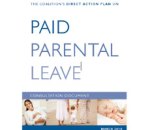This article originally appeared on Hoyden About Town.
Mostly via tweeps, info on certain last minute Coalition announcements.
First, people saw the original version of The Coalition’s Policy to Enhance Online Safety for Children (original version), which read:
We will work with mobile phone companies (such as Telstra, Optus, Vodafone and their resellers) to develop online safety standards for smartphones and other devices with mobile network connectivity such as tablets, applicable to their use by children in two age groups: children up to the age of 12 years and teenagers.
As has recently been achieved in the UK, we expect these standards will involve mobilephone operators installing adult content filters on phones which will be switched on as the default unless the customer proves he or she is at least 18 years of age.
The Coalition will work with internet service providers (which provide fixed line broadband services to the home) to develop online safety standards for those services, recognising that they are very often accessed by children.
As has recently been achieved in the UK, we expect these standards will involve the major internet service providers providing home network filters for all new home broadband services, which will be switched on as the default unless the customer specifies otherwise.
This is a very different approach to the discredited compulsory filter proposal championedby the Rudd-Gillard Government, which was abandoned as unworkable.
The Coalition’s approach aims to empower parents — by giving them the choice of whetheror not to operate a filter at home, but by establishing the default setting as one which provides maximum protection.
The Coalition’s Policy to Enhance Online Safety for Children original/repudiated version, page 7
The Coalition very quickly backed away from this proposal:
Mr Turnbull quickly released a statement to clarify the Coalition’s position.
“The Coalition has never supported mandatory internet filtering. Indeed, we have a long record of opposing it,” the statement said.
Malcolm Turnbull’s statement is available in full on the Liberals’ site. The revised and/or correct version of the policy (depending on if you believe that they did accidentally make an early version public), reads:
Wewill work with mobile phone companies (such as Telstra, Optus, Vodafone and their resellers) and internet service providers (which provide fixed line broadband services to the home) to make available software which parents can choose to install on their own devices to protect their children from inappropriate material.
This is a very different approach to the discredited compulsory filter proposal championed by the Rudd-Gillard Government, which was abandoned as unworkable.
The Coalition’s Policy to Enhance Online Safety for Children current version (as linked from the Liberals’ policy listing), page 7
Moving on to last minute announcements they haven’t backed away from:
A Coalition Government, if elected, will crack down on Labor’s addiction to waste by auditing increasingly ridiculous research grants and reprioritising funding through the Australian Research Council (ARC) to deliver funds to where they’re really needed.
Some of the grants issued by the ARC in recent years have been, frankly, completely over the top.
There will be no reduction in research funding. In fact, the Coalition has announced new research into dementia and diabetes.
The Coalition would look to targeting those ridiculous research grants that leave taxpayers scratching their heads wondering just what the Government was thinking.
Taxpayer dollars have been wasted on projects that do little, if anything, to advance Australians research needs. For example:
- The quest for the ‘I’ – a$595,000 grant aimed at “reaching a better understanding of the self”;
- $160,000 on an examination of “sexuality in Islamic interpretations of reproductive health technologies in Egypt”;
- a $443,000 study into “The God of Hegel’s Post-Kantian idealism”; and
- $164,000 for a study into “how urban media art can best respond to global climate change” .
Ending More of Labor’s Waste, Liberal press release, September 5 2013
(My Honours supervisor is out there jumping for joy at the punctation used for that list, at least.)
Several research and research-affiliated groups have denounced the policy:
- Jeannie Rea, National Office, The National Tertiary Education Union:
This is a direct attack on the academic freedom of researchers working in Australian universities. If Tony Abbott wins, independent research loses.
- Catriona Jackson, CEO, Science and Technology Australia:
Specific research projects – all in the arts and social sciences – have been labeled
increasingly ridiculous
. But scientists know that the flow of new knowledge is critical to the kinds ofreal word
results that all Australians are proud of, and that the Coalition is calling for.It was CSIRO scientist John O’Sullivan’s search for exploding black holes that led to his discovery of wireless technology that has swept the world, and earned Australia $500 million in royalties with probably as much again to come.
You can also review STA’s overview of science policy for the Federal Election, if interested. The Conversation has a couple of pieces about the policy, one noting that we already have a body of expert scrutineers who reject any number of bad and merely only very good grant proposals, and we call it the Australian Research Council, and the other analysing the craftiness of the press release itself.
What else have you seen sneaking in under the radar now that the advertising blackout is in place?
Front page image credit: Election Day CC BY-SA David Morgan-Mar, from the 2007 Federal election.

